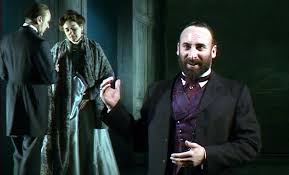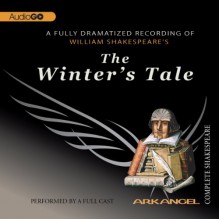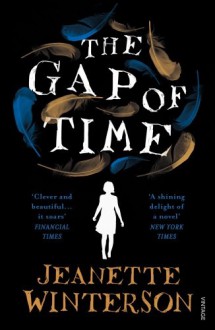LEONTES
Is whispering nothing?
Is leaning cheek to cheek? Is meeting noses?
Kissing with inside lip? Stopping the career
Of laughter with a sigh?—a note infallible
Of breaking honesty. Horsing foot on foot?
Skulking in corners? Wishing clocks more swift,
Hours minutes, noon midnight? And all eyes
Blind with the pin and web but theirs, theirs only,
That would unseen be wicked? Is this nothing?
Why then the world and all that's in't is nothing,
The covering sky is nothing, Bohemia nothing,
My wife is nothing, nor nothing have these nothings
If this be nothing.
This play is bonkers, but I really kinda like the way it asks questions of human frailty and the capacity of both repentance and forgiveness, as well as the question of what makes family.
Unfortunately, it was not the original play that turned out to be the most interesting for me, but the adaptations of the play - both on stage and as imaginings of the story in Jeanette Winterson's offering for the Hogarth Shakespeare series.
First off, the play: I read the play while listening to the Arkangel Shakespeare audio production, which was the only way I finished the play. Had I read it on the page alone, I would have fallen asleep so many times, I could not even count them.
The main issues I had was that this is a play of many parts and neither really seemed connected to the previous. I was lost quite a bit. I found it puzzling in that the plot seemed to jump from one thing to another for no reason at all and then tried to jump back to something else altogether as if the author wasn't sure what tale he wanted to tell.
Looking back at it, the jumping from one scene/setting to another also seemed a bit symptomatic of the state of mind of one of the main characters - Leontes, whose sudden outburst of jealous rage is the catalyst of the play.
Leontes seems to switch back and forth between sane and insane moments, while steadily drifting into madness. There was a Lear moment in this somewhere.
Btw, the Doran/Sher production of the play (1999) deals with this beautifully - Sher adopts a clear but understated facial tick in the scene where he first shows his jealousy, then gets visibly more nervous, twitchy, and sweaty as he unravels.
But anyway, the disjointed story-telling was a huge distraction for me. At one moment, we have Perdita abandoned in the woods and her escort killed off-stage by the famous bear. In the next moment we have that gap of time putting us into the future and needing to learn who all of the new characters are once again.
It was not great.
Nor was the ending. I seriously had problems staying awake, and once I did I had to re-read what happened because it seemed so disconnected from the tone and characters of the beginning of the play.
No spoiler's but it somehow seemed that Shakespeare started writing a revenge tragedy but then got distracted and ended with a rom-com.
Yup, the ending was to me just as inconceivable as the event at the beginning of the play that sets off the whole plot: What exactly was it that drove Leontes into that jealous rage??? And if he was jealous by character, how come Hermione does not relate this in either her words to Leontes, nor her words to Polixenes, King of Bohemia (the country with the famous sea-coast)?
To me this was jarringly out of the blue and made no sense.
I also thought there were very few memorable speeches in this work. My only exceptions are the one where Leontes rages about the meaning of perceived small betrayals (see quote at the top) and the one where Paulina confronts Leontes:
LEONTES
Once more, take her hence.
PAULINA
A most unworthy and unnatural lord Can do no more.
LEONTES
I'll ha' thee burnt.
PAULINA
I care not. It is an heretic that makes the,
Not she which burns in't. I'll not call you tyrant;
But this most cruel usage of your queen—
Not able to produce more accusation
Than your own weak-hinged fancy—something savours
Of tyranny, and will ignoble make you,
Yea, scandalous to the world.
So, yes, this was not a favourite play in its original.
HOWEVER - I had a chance to find recordings two stage productions of the play over the last couple weeks. (Actually, I found three but let's not go overboard...) One of the cinemas in town showed a repeat of the 2015 screening of the play starring Kenneth Branagh as Leontes and Judi Dench as Paulina.
It was ok, but nothing I would watch again. Dench over Branagh any time... but I've seen Dame Judi in better plays, and even she didn't make me love this one.
The second production I found (at the library) was the Greg Doran production starring Antony Sher as Leontes and Estelle Kohler as Pauline - who was MAGNIFICENT!!! - which was lot more enjoyable to watch. Somehow it just seemed that the actors and production as a whole invited the audience into the play and into the workings of interpreting the play for the stage. It was still an odd play...but I felt it translated better into physical theatre.
My favourite interpretation of the play, however, has been Winterson's The Gap of Time, which sees the story transported into modern times and set in London, Paris, and New Orleans.
I loved how Winterson used new technology such a surveillance cameras, video games, music, cars, as devices to speed up the plot and create an urgency to the story that was missing in the original (which is probably why I found it so difficult to stay awake).
Winterson also added another layer to the original story of sex, jealousy, and (inconceivable) forgiveness - Winterson dared to explore in more detail what it means to the characters to be torn our of their original family setting and be re-assembled in other family structures:
Leontes cannot accept that Perdita is his daugther, so he abandons her and by doing so alienates himself from the rest of his "family" - his wife, his best friend, his most loyal employee. But this is reciprocated. Each of them loose what they had Leontes and become sort of drifters in time.
I loved the way that Winterson contrasts Leontes' abandonment with the ability of other characters to accept people as family who are not blood relations. There is probably some reasonable link to Winterson's own upbringing etc., but I like to think that this imagining of this particular aspect of the play is not personal to the author alone.
Anyway, ratings:
The original play - 2*
The Gap of Time - 4*



 Log in with Facebook
Log in with Facebook 



![William Shakespeare - The Winter's Tale - Complete Edition [1998] [DVD] [1999] - Anthony Sher,Emily Bruni William Shakespeare - The Winter's Tale - Complete Edition [1998] [DVD] [1999] - Anthony Sher,Emily Bruni](http://booklikes.com/photo/max/220/330/upload/books/6/b/6b6c54ed82555863ce5d81c0700eb104.jpg)








